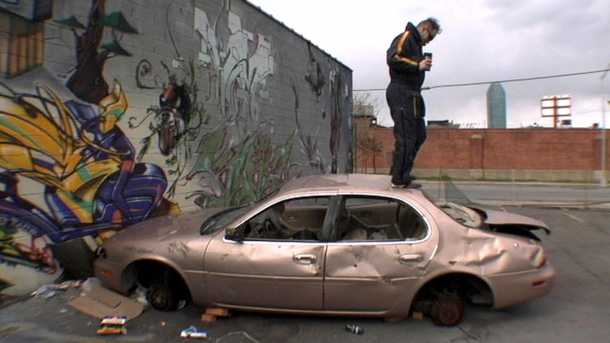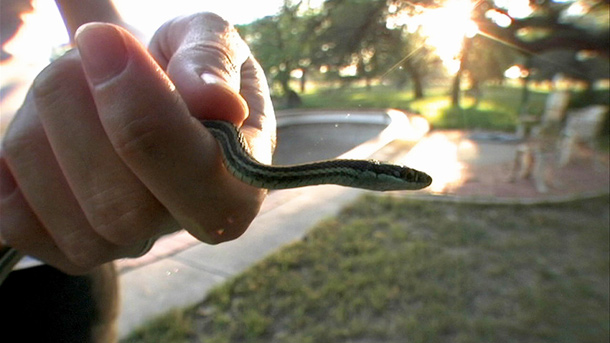IONCINEMA.com’s IONCINEPHILE of the Month feature focuses on an emerging filmmaker from the world of cinema. This February, we feature Matt Boyd, an independent filmmaker whose debut docu feature, A Rubberband Is an Unlikely Instrument premiered at such fests as Hot Docs in Toronto and Raindance Film Festival in London, and is now set to be released theatrically (with a one week run starting February 8th at ReRun Theater in Dumbo Brooklyn) via Factory 25 folks. We’ve charted the filmmaker’s journey into film and how he found the subject for his documentary and as added bonus material: you can plunge into Matt Boyd’s personal Top Ten films of all time.
Eric Lavallee: During your childhood…what films were important to you? How did your love affair with film began?
Matt Boyd: I can’t say any films were necessarily very important to me as a child. I’ve always loved movies, but as a kid it was never high on my list of interests or priorities. I was way more into sports at that time, all the way into my teens. In high school I actually hoped I’d get picked up by a sponsor and skateboard most of my early adult life…that didn’t work out. I definitely remember the impact Star Wars made and I was a little obsessed with it as a trilogy of movies. E.T. too, but mostly because I was BMX’er at that time. But, it never occurred to me that making movies was something I’d want to do, or even that it was an option in life. I wasn’t actually aware of a single director until film studies much later in college. I think in a very indirect way, skateboarding and in particular skate videos and the overall culture had a profound effect and cause for my desire to make movies. Something I didn’t realize till much later. The skating was the obvious entry point to those videos, but what I always liked most were the little impromptu documentary snippets in-between the skating. That raw, intimate glimpse of skaters you looked up to, the occasional strangely scripted scene, or the accidental people, places and immediate environment was always something that really caught my interest.
Lavallee: During your formative years what films and filmmakers inspired you?
Boyd: I was a late bloomer in terms of career/life direction. I finally decided film might be something I could pursue in my late twenties. Even then it took a whole semester of Film History to actually decide this was something I could and wanted to do. I remember distinctly sitting in class after watching Breathless for the first time and finally having that ‘moment’ where I got that spark. From there I started aggressively seeking films and directors that hit me on that gut level. I saw L’Avventura soon after… I had no idea what it was or why I was so drawn to it, but it had a pretty profound effect as well. I think the best period of filmmaking, still, might be the late 60’s and 70’s both here and abroad. Five Easy Pieces, Two Lane Blacktop, Harold and Maude, Contempt, Two or Three Things I Know About Her, 400 Blows, The Passenger, Taxi Driver, La Notte, Aguirre Wrath of God, Stroszek, everything Tarkovsky. I was also a big fan of Robert Frank (still am), so photography has always played an integral part in my influences; Eggleston, Stephen Shore too.
Lavallee: Your body of work prior to your feature debut includes short docs, vids, commerical work — how did you find yourself in film?
Boyd: Well when I finally decided I wanted to do this, my intention during, and straight out of school was to make films. I’m drawn to specific kinds of documentaries but have a much deeper love for narrative films. In a way, I find that they can be truer to life than non-fiction, and often much more pleasurable to watch. So, from a very early start, I was kind of obsessed with the idea of merging elements of documentary and narrative in a cohesive way. It just took a while to finally get there. My early work as a hired cinematographer, editor and director was almost always documentary based, often in music. Both before and during my first couple years in NY I was still very much involved in making commissioned films of that sort, as well as working as a hired cinematographer on various documentaries, high and low, commercial and personal. The nature of most of that work was very run and gun due to budgetary and other creative forces at play. While it was great to get paid to do those things, I was really feeling the need to do something far more personal, something where I had a lot more control where I could really exercise my own ideas and start articulating and evolving my own language.
Lavallee: What is the genesis of the project? How did your propose the project to the Bakers? And what drew you in?
Boyd: Meeting Walter just happen to coincide with these feelings/needs to make my first film. We actually met on the street (we lived a block away from each other) through my neighbor. He was headed to the subway to ‘play’ but he was empty handed; thus my introduction to the ‘rubberband horn’. I was really fascinated with it and his playing. We continued to bump into each other from time to time and eventually discussed putting some of his music to some stuff I’d been shooting in/around the city at the time. Long story short, that idea never materialized, but a ridiculous argument over some red sunglasses and his “je ne sais quoi” sparked a crazy idea that I should make a film on him. From that moment it was probably another year before I fully committed and began to shoot the film. One of the reasons I decided to make a film on him, initially, was the idea that he was so open. From the very start, he was very free with all aspects of his life; he was telling me very personal things about him and his life after knowing me only briefly. That said, I entered the idea of shooting a feature very carefully; we talked about it and I mulled it over for almost a year before deciding there was enough there to make a feature. So, to answer more directly, I think it was a bit of both although I absolutely did not want to make a music documentary. I made that very clear from the outset, that it would be more mood and character based; the music was simply a bonus, a texture woven into the fabric of something much greater.
Lavallee: Could you elaborate on the film’s chosen title?
Boyd: I’m not sure I can, doesn’t it speak for itself? Kidding aside, it just kinda hit me one day very very early on…I said it as kind of a joke, and figured something better would come along…but it didn’t. I’m sure there are deeper things to be read into it, but I’ll leave that to others.
Lavallee: What ideas did you have for the style of the film? What inspirations (other films, location, paintings etc…) did you draw upon for the look/style, aesthetics of the film?
Boyd: I actually entered the making of this film with the idea that it wasn’t a documentary, more so a narrative with documentary subjects. I knew that it was going to be a film I was going to have to make solely on my own, but one that would be impossible to make from a traditional vérité approach. I actually had no interest in making that kind of film, and even if I did it would have been impossible given I had a family and commercial work to keep up with. There was just no way I was going to be able to keep up with every detail, moment, argument and I’m not really interested in that kind of filmmaking. So, I essentially wired my thinking in terms of making a narrative. We would try to have weekly, bi weekly or monthly debriefings in order for me to know what was going on, and from there I would decide what was interesting, what would push the story forward, then we would schedule a shoot and so on. There was a lot of pre-thought and often blocking of scenes when possible; they were so natural on camera so I would set simple blocking parameters and they would essentially live their lives within them. As far as inspirations, it wasn’t any one thing specifically, especially with movies, but definitely an amalgamation of my tastes. Eggleston was someone who constantly came to mind though (and still does), just in a way of looking. I also love Andrew Wyeth, so maybe that’s in there, I don’t know? It’s definitely what’s considered a ‘slow burn’ film and that’s very deliberate; I certainly believe wholeheartedly in the long take when done right, but that definitely wasn’t imposed for the sake of stylization. It was a language and tone that was of my sensibilities, but more importantly it suited their temperament, their daily rhythms.
Lavallee: I’d like for you to underline key people that contributed the most in creating your film.
Boyd: During production I was the sole crew member running both camera and sound exclusively. That said, I’d be very remiss if I didn’t include my wife and daughter in the making of this film! She was incredibly supportive through-out the entire process and bore the brunt of all of the difficulties along the way. My co-editor Michael Carter was definitely an important contributor. He’s not only a great editor, but we share similar sensibilities in many ways from films, music, art, all the way to our sense of humor and specific kinds of storytelling. He’s also a father and was able to bring an enormous amount of intuitive understanding and sensitivity to the process which was key in the editing process. Finally, the combined efforts of my producers…. while I was solo through most of the filming, all three of my producers (Jason Ross/ Show Cobra, Brooke Bernard and Ryan Zacarias / Nomadic Independence) came onboard for the final filming and post. It’s a very challenging film but they’ve all been very supportive and championed me to make the film I was determined to make at every turn. They continue to be actively involved in both this film and the next.
For more on A Rubberband Is an Unlikely Instrument – visit the FB page, official site, and Factory 25 Films.




